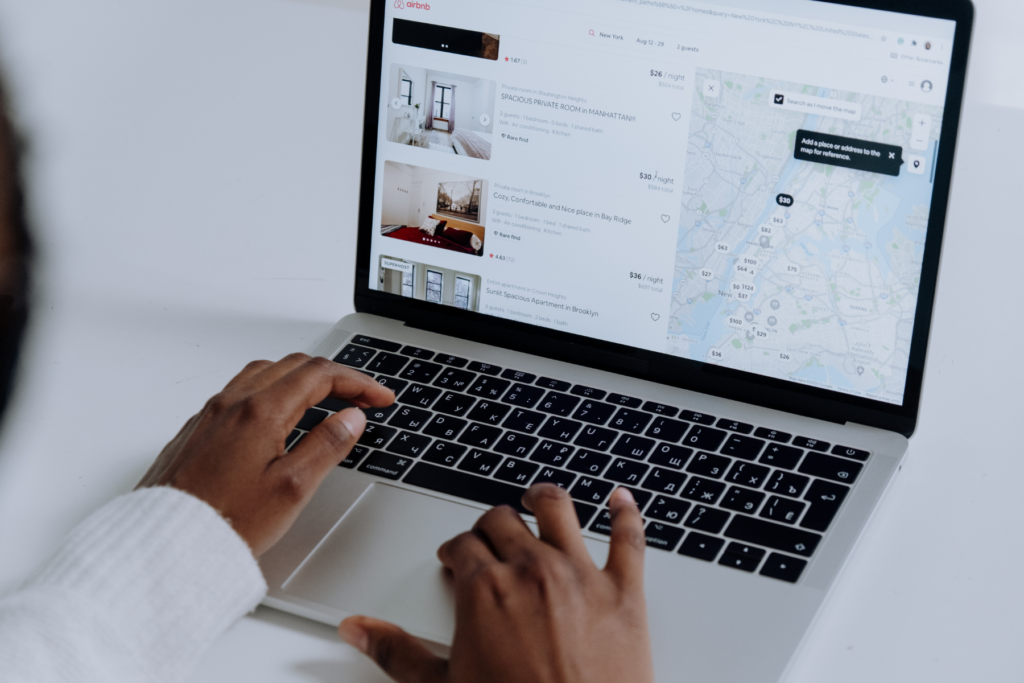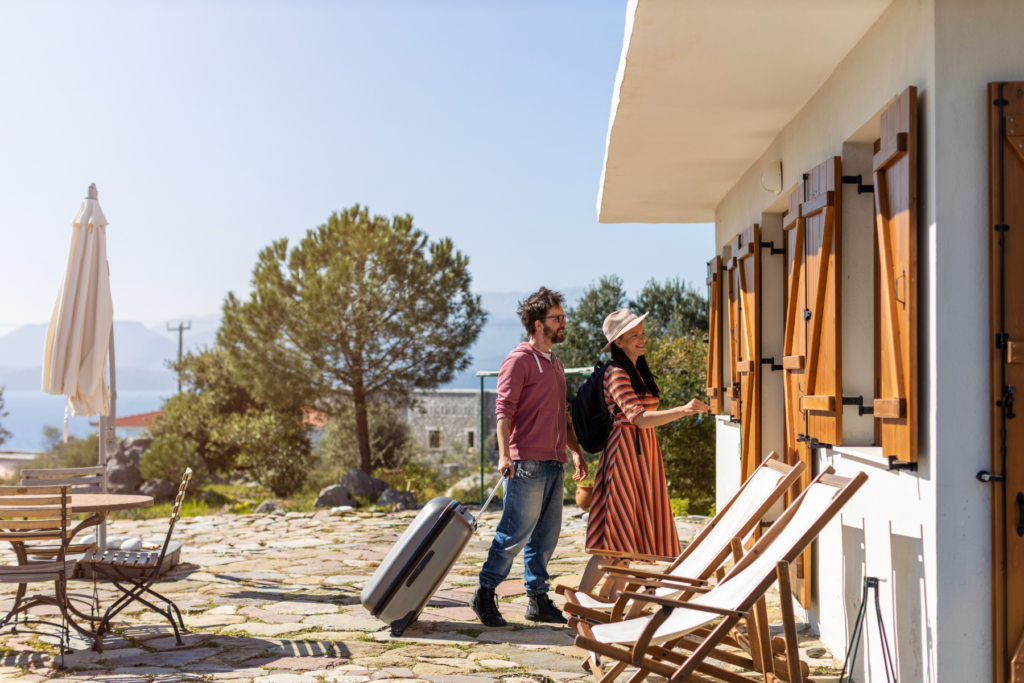Women are outearning men on Airbnb. In 2021, female hosts made more than $12 billion.
The global gender pay gap has women making 77 cents for every dollar a man earns, according to the United Nations. The organization adds that we likely won’t reach gender pay parity until 2069.
Women represent just 24% of C-suite jobs in the U.S. and Canada. There are fewer women in CEO positions at Fortune 500 companies than there are men named James.
So, this Airbnb news is pretty amazing.
Francesca Baglio, a licensed real estate broker and creator of Short Term Rental Master Academy said the feminine touch that women bring to hosting is something that is not as innate to men.
Why Airbnb and not long-term rentals?
Francesca said the profit margins on an Airbnb rental are insane compared to long-term rentals. So for some people, a long-term rental is a good fit if you don’t have time to dedicate, you’re just not ready to scale and hire out a property manager or co-host, or you want to put the passive in passive income.
“I advise all of my clients, friends, and family to go for Airbnb as property owners if you can and just figure out a way to make it work. Because like I said, the margins are absolute insanity.”

15 Ways Women are Investing in Airbnb Real Estate
This blog post was written after I interviewed Francesca on my podcast, Become a Media Maven. Click here to listen to the entire interview. I’ll also link to the video here.
1. Look for markets an hour or two outside your home market if you live in a place where the cost of living is high.
If you’re buying in a really expensive market, of course, a down payment is going to seem very out of reach as an initial upfront investment. Look for markets that might be an hour to two hours outside of your home market.
There are so many suburban areas and rural areas where you can easily operate a really awesome business. For example, if you live in New York City (where I do) and you need a million dollars just to get in the door for a basic apartment, there are tons of small cities and different cities within an hour to two hours’ drive. Whether it’s New Jersey, Connecticut, or upstate in the Catskills, you can buy a property for $300,000 or $400,000 and your down payment is gonna be much more affordable.
This is an option for people who live near San Francisco, South Florida, and other expensive home markets in the United States.
2. Buy lightly used furniture on Facebook Marketplace or visit an antique store.
There are ways to mitigate costs. You can use the Facebook marketplace to buy lightly used furniture. You can also go to antique stores, which a lot of people are doing these days, and make a really cool rental with a few antiques sprinkled in here and there.
That also saves a lot of money while also maintaining really cool historical character of a lot of places.
3. Invest with partners, like family, friends, and people who have strengths you don’t have.
My friend and I have been driving all over the place this past week. Inventory is just crazy right now. It’s at an all-time low, so you’re having to basically drive up to listings the day after it’s listed and make really aggressive offers.
There are so many people out there who have one piece of the puzzle to offer, whether it’s expertise, money, or time. If you know what your forte is and you know what you can bring to a deal, focus on that and try to network with people who can fill in those other gaps for you.
If you’re not ready to do it on your own, look for somebody who has some experience or if you have really good knowledge, look for a money partner who has been wanting to get into Airbnb for years, but just doesn’t have the know-how or the time or the skill set to do so.
This is a great investment strategy for both Airbnb properties and commercial properties.

4. Do some of the renovations yourself, like painting walls or cabinets.
We do love to do a mix of DIY and hiring contractors for other projects. We do things as much as we can when it comes to painting, installing cabinets, and more approachable projects. We love to put sweat equity into our properties.
It definitely saves us a lot of money. It’s not always the most time-effective approach because you always end up taking a little bit longer to complete projects than you think you will, but it brings a certain amount of pride to every project… and extra income.
5. Research the market you’re going to buy in and focus on places like lake communities, areas with lots of restaurants, etc.
We do a lot of due diligence. This market in Connecticut that we just recently bought is only 20 minutes away from my mom’s house, so we know what an awesome spot it is. It’s right on a lake.
It’s a lake community, so people from the city flock to it in the summer. There are also a lot of restaurants up there. There’s a marina where anyone can rent a boat, which is really awesome if you’re from the city and you wanna be a part of that lake life scene. It’s a vacation rental-friendly place because you have these experiences at your fingertips.
I also do a lot of analytics on the markets, vacation rentals, and the inventory that’s out there. I look at the calendars on Airbnb and VRBO and see how full they are and what the average price per night is.
We also use some other websites that give us data which are super, super helpful. That way we’re able to vet the neighborhood and also make projections based on properties that we’re interested in making offers on.
6. Bust out the spreadsheets and look at the calendars on Airbnb and VRBO to analyze markets and make projections, like:
I would say the first step is to analyze markets. Once you figure out which area might be a good fit for you, run some numbers.
It’s so, so important to underwrite your properties and project what you’ll make. When I’m underwriting potential investments, I always do three scenarios.
a. Data online as a middle ground
b. Look at your best-case scenario
c. Look at your worst-case scenario
I use the data that I find online as my middle ground. And then I also adjust the numbers for like a worst-case scenario and then a best-case scenario because I like for all of my Airbnb listings to be totally optimized and for my occupancy rate to be as high as possible. I would like to outperform the average data.
Even in the worst-case scenario, the numbers have to work before I make an offer on a property and become a property owner. It’s the best way to ensure you’re making enough money when real estate investing.

7. Check out free resources and Facebook Groups about investing.
I highly recommend The Short-Term Show by Avery Carl. It’s a podcast.
I also am in some females-only investing groups on Facebook. I’ve learned so much from those forums and any question that you have, you can pop it in there and ask away. Chances are a lot of the questions have already been answered, so you probably don’t even need to. Many times you can just search for a topic and it’s more than likely gonna be covered and there are pictures and videos often to go along with a post. So it’s just an invaluable resource to me.
8. Hook up with an agent who specializes in investing and short-term rentals in your area.
I always recommend hooking up with a real estate agent who specializes in investing and short-term rentals. Avery Carl is an example of a real estate agent in the Smokey Mountains who covers the area specifically for investor clients.
There are agents in just about every market who specialize in investing and often short-term rental investing. It’s become more and more popular. So in these markets, more and more agents are becoming experienced and qualified in advising on potential investment properties.
Interview an agent who specializes in Airbnb or short-term rentals and pick their brain about their experience. Ask them about the market, and how different properties are performing within that market, and go from there.
9. Get in the right money mindset to invest in real estate.
Real estate is expensive. It’s a big investment, but you’re never throwing your money away when it comes to real estate.
When you’re investing in the stock market or investing in a new business venture or a company that sounds exciting, you’re kind of like, “here’s my money” and the rest is speculation. It might be a great idea, or a great concept, or a great prospect, but you really never know what’s going to happen with your investment.
When you invest in real estate, you have the collateral of a house, a property, or an apartment. There’s something very concrete about that investment and you don’t get that with other types of investing.
At the end of the day, if you buy a property for Airbnb investing and it doesn’t work out because you realize the work is too much, it’s not kind of your jam, or the market isn’t where you want it to be, you have multiple exit strategies. You can pivot and get long-term tenants to rent it or you can sell it, more than likely for a profit because the market is crazy these days. You can even flip it. You have tons of options.

10. Automate things like paying for utilities.
Regarding utilities and monthly maintenance, those are all things that can be set up. You can automate as much as you want to. A great next step and a great way to ensure consistency on a regular basis are to not spend too much time on things that can be automated, like paying bills and other operating costs.
11. Hire a property manager or co-host if you don’t want to worry about the day-to-day responsibilities.
If you do want to scale beyond one or two properties, you can hire a property manager or a co-host who can take some of these things off your plate.
You can save yourself money by dealing with them directly, but there’s an option to hire out. Guest communication is another thing that can be outsourced, so it doesn’t have to feel like another job.
There are a lot of co-hosts who will do this for you for a fee. I generally see a 10%- 20% co-host fee or property management fee of your rental income for this.
I always recommend trying it out in the beginning. Then you can switch over to property management after a couple of months if you want, but automation is a really helpful thing when it comes to scaling.
12. Make your short-term rental Instagramable as if it’s a brand.
There are a bazillion short-term rentals out there and I think a lot of times that scares people off and they couldn’t compete. If you brand yourself and brand your property and make it stand out on Instagram and through all of the different social media platforms, you’re going to do well.
You’re going to outperform the competition, your calendar is gonna be booked solid, and your average nightly rate is going to be much higher, and therefore your revenue and take home will blow the competition out of the water.

13. Don’t do a same-day turnover when you’re starting out.
Don’t do same-day turnover when you’re first starting out. You may need that breathing room to figure out how long it’s gonna take you and your cleaning service, or your turnover team, to get all that stuff done.
It can be really overwhelming and it’s very important to receive good reviews in the online marketplace, so this is something to be mindful of for both property managers and local hosts.
14. Turn to Airbnb for help.
Airbnb is letting you ask other Airbnb hosts for things like, “Can I do a same-day turnover with this cleaning crew I have?”
15. Visit InvestHerCollective.com and learn from the best!
I am learning from Francesca now and hope to share future rental properties with you very soon!
What about you? Are you getting into the real estate market or are you a real estate investor already? Find me on Instagram at @ChristinaAllDay and tell me!

In a book published by Bigger Pockets, I’ve read about people using a spare bedroom in their primary residence as a rental property to break into the Airbnb business and make some extra money.
How did you start your career as an Airbnb host? Was it with long-term tenants? As a side hustle? I’d love to hear from new hosts with all your tips and tricks as I plan to get started.
